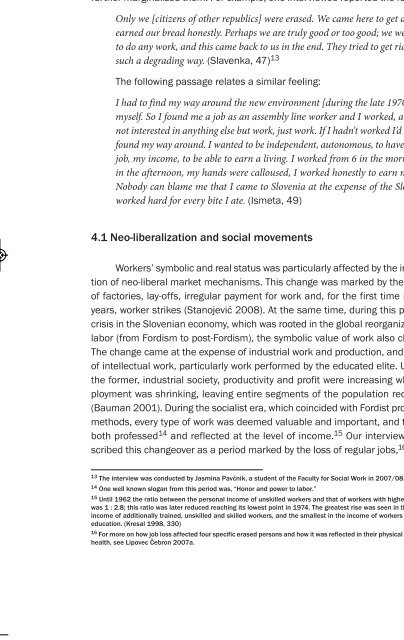The Scars of the Erasure_web
The Scars of the Erasure_web
The Scars of the Erasure_web
- No tags were found...
You also want an ePaper? Increase the reach of your titles
YUMPU automatically turns print PDFs into web optimized ePapers that Google loves.
<strong>Erasure</strong>_4a 10.1.11 20:29 Page 3030 THE SCARS OF THE ERASUREto feel redundant, as individuals and as workers. <strong>The</strong> locus <strong>of</strong> <strong>the</strong>ir identification,“hardworking workers” (employment was <strong>the</strong> most frequent reason for movingto Slovenia among <strong>the</strong> first generation immigrants), was vacated, while <strong>the</strong> substitution<strong>of</strong> <strong>the</strong> Slovenian nation for <strong>the</strong> workers as <strong>the</strong> bearer <strong>of</strong> sovereignty onlyfur<strong>the</strong>r marginalized <strong>the</strong>m. For example, one interviewee reported <strong>the</strong> following:Only we [citizens <strong>of</strong> o<strong>the</strong>r republics] were erased. We came here to get a job. Weearned our bread honestly. Perhaps we are truly good or too good; we were readyto do any work, and this came back to us in <strong>the</strong> end. <strong>The</strong>y tried to get rid <strong>of</strong> us insuch a degrading way. (Slavenka, 47) 13<strong>The</strong> following passage relates a similar feeling:I had to find my way around <strong>the</strong> new environment [during <strong>the</strong> late 1970s] all bymyself. So I found me a job as an assembly line worker and I worked, and I wasnot interested in anything else but work, just work. If I hadn’t worked I’d not havefound my way around. I wanted to be independent, autonomous, to have my ownjob, my income, to be able to earn a living. I worked from 6 in <strong>the</strong> morning to 6in <strong>the</strong> afternoon, my hands were calloused, I worked honestly to earn my wage.Nobody can blame me that I came to Slovenia at <strong>the</strong> expense <strong>of</strong> <strong>the</strong> Slovenes. Iworked hard for every bite I ate. (Ismeta, 49)4.1 Neo-liberalization and social movementsWorkers’ symbolic and real status was particularly affected by <strong>the</strong> introduction<strong>of</strong> neo-liberal market mechanisms. This change was marked by <strong>the</strong> closure<strong>of</strong> factories, lay-<strong>of</strong>fs, irregular payment for work and, for <strong>the</strong> first time in manyyears, worker strikes (Stanojević 2008). At <strong>the</strong> same time, during this period <strong>of</strong>crisis in <strong>the</strong> Slovenian economy, which was rooted in <strong>the</strong> global reorganization <strong>of</strong>labor (from Fordism to post-Fordism), <strong>the</strong> symbolic value <strong>of</strong> work also changed.<strong>The</strong> change came at <strong>the</strong> expense <strong>of</strong> industrial work and production, and in favor<strong>of</strong> intellectual work, particularly work performed by <strong>the</strong> educated elite. Unlike in<strong>the</strong> former, industrial society, productivity and pr<strong>of</strong>it were increasing while employmentwas shrinking, leaving entire segments <strong>of</strong> <strong>the</strong> population redundant(Bauman 2001). During <strong>the</strong> socialist era, which coincided with Fordist productionmethods, every type <strong>of</strong> work was deemed valuable and important, and this wasboth pr<strong>of</strong>essed 14 and reflected at <strong>the</strong> level <strong>of</strong> income. 15 Our interviewees describedthis changeover as a period marked by <strong>the</strong> loss <strong>of</strong> regular jobs, 16 <strong>the</strong> ex-13 <strong>The</strong> interview was conducted by Jasmina Pavčnik, a student <strong>of</strong> <strong>the</strong> Faculty for Social Work in 2007/08.14 One well known slogan from this period was, “Honor and power to labor.”15 Until 1962 <strong>the</strong> ratio between <strong>the</strong> personal income <strong>of</strong> unskilled workers and that <strong>of</strong> workers with higher educationwas 1 : 2.8; this ratio was later reduced reaching its lowest point in 1974. <strong>The</strong> greatest rise was seen in <strong>the</strong> personalincome <strong>of</strong> additionally trained, unskilled and skilled workers, and <strong>the</strong> smallest in <strong>the</strong> income <strong>of</strong> workers with highereducation. (Kresal 1998, 330)16 For more on how job loss affected four specific erased persons and how it was reflected in <strong>the</strong>ir physical and mentalhealth, see Lipovec Čebron 2007a.


